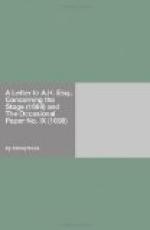The Objection against the Play-House it self, because it gives Opportunities for Wickedness, is so trifling, it is hardly worth answering, for they who are viciously inclin’d will find an Opportunity; and as long as the Toleration Act is in force, there is never a Meeting in Town but will afford extraordinary Hints of that kind; the Morning and Evening Lectures are precious Seasons, Mr. Doelittle may thresh his Heart out, there will be Tares among the Wheat; and those Houses are haunted with a sort of Spirits that are not to be cast out with Prayer and Fasting.
I think from the little I have said, it is certain the Town has not been debauch’d by the Stage, and that ’tis much easier to demonstrate the Good, than prove the Evil Effect even of our bad Plays. I have shew’d that there has been a Vertue in them; and we might very well pardon them if it were only for that one Benefit, of being so serviceable to the reclaiming of the Clergy. If they can give me an Instance of any Play, whose Vices have had so ill Effect with the People as to counter-balance the Good it has wrought in them, I shou’d set my self against the Stage too; but then as to other Advantages which we have receiv’d from the Plays of the first Rank, we are certainly very much in debt to them. The Refinement of our Tongue is principally owing to them; Good Manners and good Conversation is owing to our Comedy; and I don’t doubt but some of our Tragedies have fired some with a Greatness of Spirit, and taught to act the Hero with Prudence, Vertue and Courage.
I shall conclude this part of my Letter with this Observation, that if the present Stage has not been so terrible an Enemy to Christianity, but on the contrary, has afforded a great deal of good to the World; that a Regulated Stage wou’d be of infinite Service to the Nation.




